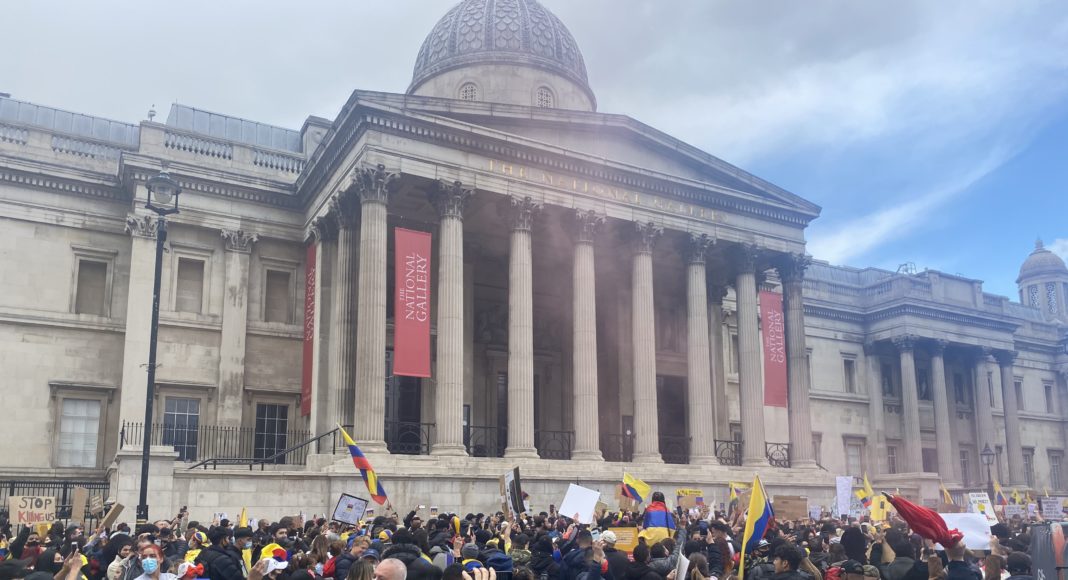In a rainy Trafalgar Square in London, last Wednesday 5 May, hundreds turned up to protest the violent police response to demonstrations against inequality in Colombia. Similar events have been held in Sydney, Toronto, Washington, New York, Paris, Barcelona, Madrid, Brussels and Bristol in an impressive show of international solidarity with Colombians. The world, it seems, is watching.
Dozens have died in Colombia since the protests began with a general strike on 28 April. Hundreds more have been injured by indiscriminate police violence. According to Amnesty International, multiple cases of enforced disappearances and sexual assault at the hands of police have been reported.
Before officers began firing on unarmed demonstrators with live ammunition, and before the government sent tanks charging through urban neighbourhoods, there had been an outcry against the pandemic-related tax reform plan of President Iván Duque.
While the plan has since been abandoned, the anger and despair it provoked have only grown more vehement in a country ravaged by Covid-19. The virus has claimed over 75,000 lives in Colombia and has exacerbated the divide between rich and poor.
The EU and the US State Department are among those government organisations that have urged calm and advised restraint. The British embassy in Bogotá has expressed hope for dialogue between the government and protestors.
A recent article from The Canary, however, describes how the police tactics condemned by the UK are the very same tactics taught to them by British advisors. Colombia’s notoriously brutish ESMAD (Mobile Anti-Disturbances Squadron) are, in part, The Canary claims, their protégés.
Yet unceasing domestic demonstrations and international pressure seem to be taking effect.
After days of apathetic silence from the presidential palace in Bogotá, during which parts of the country burned and innumerable videos recorded horrific acts of police abuse, the Colombian government finally appears to be ready to negotiate.
Duque has spent the last couple of days attempting to defuse the bomb he helped light with words of reconciliation and a path forward.
‘We had a productive meeting with the coalition of hope, a great opportunity for dialogue, overcoming differences and without political point-scoring,’ he explained via Twitter on Friday.
The political opposition remains dubious, however. They’ve heard such talk before, as when Duque promised a similar table for discussion following the 2019 protests that swept through Colombia. He failed to deliver then. Many suspect he will again now.
Jorge Robledo, a senator with the Coalition of Hope, said the group ‘met with President Iván Duque as an opposition and we left as an opposition.’
As talks go on, global demonstrations continue. The Colombian diaspora is engaged even from afar. ‘Lejos pero no indiferente’ – far away but not indifferent – read one sign at the London protest. ‘Unidos desde el extranjero,’ or united from abroad, said another.
The rain that swept in among the demonstrators on Wednesday afternoon did little to deter the passion of their opposition. Some in the crowd remarked that the stormy conditions felt, rather appropriately, like the habitually cloudy Bogotá.
The pots and pans of the cacerolazo and the sound of proud vuvuzelas thundered on through the wind. Beneath their umbrellas, demonstrators chanted: “Uribe! ¡Paraco! ¡El pueblo está berraco!”
British police began to separate and dispel the plantón as the rain fell. It was a peaceful and orderly process until, as captured on video, an officer appeared to assault a man in police custody. Witnesses generally agree on the legitimacy of the man’s arrest, although many felt the violence used to restrain this man – who was already handcuffed in a police vehicle – was a cruelly ironic end to an afternoon dedicated to protesting police brutality.
If peace exists at the end of this recent bloodshed, it will be because the Colombian people, resilient in the face of extreme state violence, refuse to be cowed.
Now in their second week, the country’s protests have reached a tragic level of violence. They have also given some Colombians hope that real change might finally be possible.
Main image: Plantón por la vida in Trafalgar Square, Wednesday 5 May. Liam Sousa Casey.

